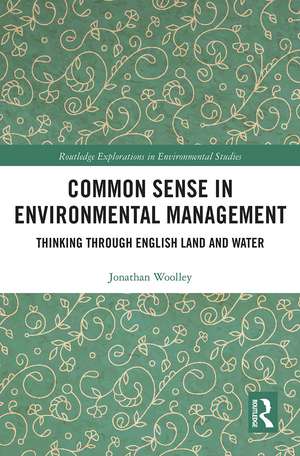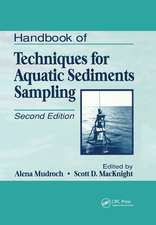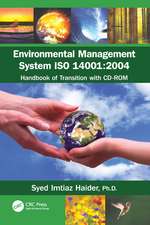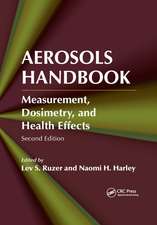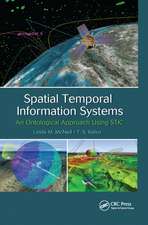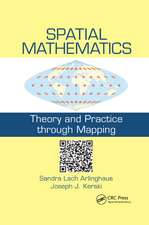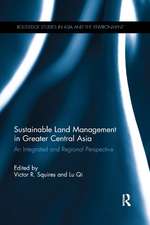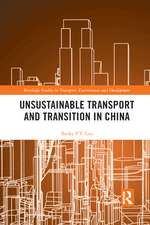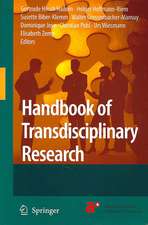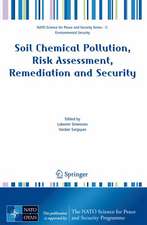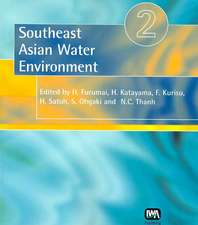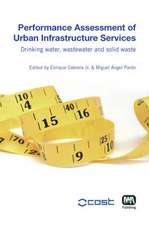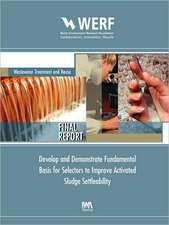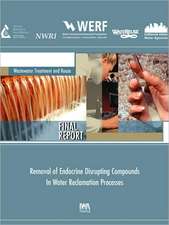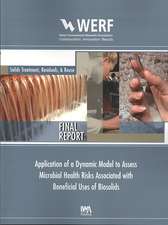Common Sense in Environmental Management: Thinking Through English Land and Water: Routledge Explorations in Environmental Studies
Autor Jonathan Woolleyen Limba Engleză Paperback – apr 2021
Common sense encourages English people to tacitly assume that the management of land and other resources should organically converge on a consensus that yields self-evident, practical results. Furthermore, the English then tend to assume that their own position reflects that consensus. Other stakeholders are not seen as having legitimate but distinct expertise and interests – but are rather viewed as being stupid and/or immoral, for ignoring self-evident, pragmatic truths. Compromise is therefore less likely, and land management practices become entrenched and resistant to innovation and improvement. Through a detailed ethnographic study of the Norfolk Broads, this book explores how environmental policy and land management in rural areas could be more effective if a truly common sense was restored in the way we manage our shared environment.
Using academic and lay deployments of common sense as a route into the political economy of rural environments, this book will be of great interest to scholars and students of socio-cultural anthropology, sociology, human geography, cultural studies, social history, and the environmental humanities.
| Toate formatele și edițiile | Preț | Express |
|---|---|---|
| Paperback (1) | 381.59 lei 6-8 săpt. | |
| Taylor & Francis – apr 2021 | 381.59 lei 6-8 săpt. | |
| Hardback (1) | 998.71 lei 6-8 săpt. | |
| Taylor & Francis – 25 sep 2019 | 998.71 lei 6-8 săpt. |
Din seria Routledge Explorations in Environmental Studies
-
 Preț: 281.77 lei
Preț: 281.77 lei -
 Preț: 243.62 lei
Preț: 243.62 lei -
 Preț: 288.80 lei
Preț: 288.80 lei -
 Preț: 294.72 lei
Preț: 294.72 lei -
 Preț: 326.82 lei
Preț: 326.82 lei -
 Preț: 310.88 lei
Preț: 310.88 lei -
 Preț: 311.33 lei
Preț: 311.33 lei -
 Preț: 326.49 lei
Preț: 326.49 lei -
 Preț: 311.41 lei
Preț: 311.41 lei -
 Preț: 311.41 lei
Preț: 311.41 lei -
 Preț: 279.45 lei
Preț: 279.45 lei -
 Preț: 309.12 lei
Preț: 309.12 lei -
 Preț: 370.84 lei
Preț: 370.84 lei -
 Preț: 416.22 lei
Preț: 416.22 lei -
 Preț: 444.62 lei
Preț: 444.62 lei - 42%
 Preț: 234.90 lei
Preț: 234.90 lei -
 Preț: 480.62 lei
Preț: 480.62 lei - 12%
 Preț: 325.34 lei
Preț: 325.34 lei -
 Preț: 443.65 lei
Preț: 443.65 lei - 18%
 Preț: 1056.28 lei
Preț: 1056.28 lei -
 Preț: 442.50 lei
Preț: 442.50 lei -
 Preț: 461.66 lei
Preț: 461.66 lei -
 Preț: 421.63 lei
Preț: 421.63 lei -
 Preț: 449.41 lei
Preț: 449.41 lei - 18%
 Preț: 1060.52 lei
Preț: 1060.52 lei - 18%
 Preț: 1109.99 lei
Preț: 1109.99 lei - 25%
 Preț: 852.63 lei
Preț: 852.63 lei -
 Preț: 389.38 lei
Preț: 389.38 lei - 18%
 Preț: 699.21 lei
Preț: 699.21 lei - 15%
 Preț: 418.51 lei
Preț: 418.51 lei -
 Preț: 416.22 lei
Preț: 416.22 lei -
 Preț: 407.57 lei
Preț: 407.57 lei - 18%
 Preț: 1056.28 lei
Preț: 1056.28 lei - 26%
 Preț: 846.09 lei
Preț: 846.09 lei -
 Preț: 438.86 lei
Preț: 438.86 lei - 15%
 Preț: 423.09 lei
Preț: 423.09 lei -
 Preț: 448.44 lei
Preț: 448.44 lei - 13%
 Preț: 296.95 lei
Preț: 296.95 lei - 18%
 Preț: 1167.71 lei
Preț: 1167.71 lei - 16%
 Preț: 65.03 lei
Preț: 65.03 lei - 25%
 Preț: 767.88 lei
Preț: 767.88 lei
Preț: 381.59 lei
Nou
Puncte Express: 572
Preț estimativ în valută:
73.03€ • 75.95$ • 61.11£
73.03€ • 75.95$ • 61.11£
Carte tipărită la comandă
Livrare economică 15-29 martie
Preluare comenzi: 021 569.72.76
Specificații
ISBN-13: 9780367777296
ISBN-10: 0367777290
Pagini: 184
Dimensiuni: 156 x 234 x 10 mm
Greutate: 0.26 kg
Ediția:1
Editura: Taylor & Francis
Colecția Routledge
Seria Routledge Explorations in Environmental Studies
Locul publicării:Oxford, United Kingdom
ISBN-10: 0367777290
Pagini: 184
Dimensiuni: 156 x 234 x 10 mm
Greutate: 0.26 kg
Ediția:1
Editura: Taylor & Francis
Colecția Routledge
Seria Routledge Explorations in Environmental Studies
Locul publicării:Oxford, United Kingdom
Public țintă
PostgraduateCuprins
Table of Figures
Preface – Common sense: A briefing for policymakers
The problem – Siloing obstructs effective Environmental Land Management
What is common sense?
How does it shape English society and land management?
How should policymakers respond?
Acknowledgements
Introduction – Common sense questions
Why: Why Common Sense?
Where: The Broads as a Fieldsite
What: A Commonsense Argument
Bibliography
Chapter 1 – Do academics have common sense?
Koinē aísthēsis and other opinions: Key philosophical debates on common sense
"Sons of the Soil": Etymologies of common sense
Common sense as a social scientific object
Common sense as a political object
Chapter 2 – What is common sense?
Common sense as a vernacular object
Common sense in vernacular use
Chapter 2: Where is common sense to be found?
Learned voices: Common land in environmental histories of Broadland
Working Voices: "Bad Farming", Tidyness and the Balance of Contemporary Rural Life in Norfolk
Concerned voices: Current trends in Britain’s rural economy
Analysis: Work, Common Land and the Process of Enclosure in Broadland
Conclusion: The Institution of Common Ground
Chapter 4 – Can you learn common sense?
Overview: Strumpshaw Fen as a Place of Desire
Underview: Thicket Description of Working Your Way Through the Landscape
Counterview: Quiet Enjoyment and Visitor Experience
Interview: Farmers, Children, and the Acquisition of Common Sense
Teleview: "Broadland Consciousness" versus "Barrier Consciousness"
Chapter 5 – Why is common sense so scarce?
Hickling Broad: A lack of common ground
Bird Farmers: Catfield Fen and Landscape-Scale Conservation
Fragmenting Corporeal Attitudes: Habitus and "The Silo Effect"
Trials and Errors: The trouble with common sense
Conclusion: Chedgrave Common and the Apogee of Commoning
Conclusions – What do we need to know about common sense?
Gillian Tett, Robert Kett, and the Division of Labour
Preface – Common sense: A briefing for policymakers
The problem – Siloing obstructs effective Environmental Land Management
What is common sense?
How does it shape English society and land management?
How should policymakers respond?
Acknowledgements
Introduction – Common sense questions
Why: Why Common Sense?
Where: The Broads as a Fieldsite
What: A Commonsense Argument
Bibliography
Chapter 1 – Do academics have common sense?
Koinē aísthēsis and other opinions: Key philosophical debates on common sense
"Sons of the Soil": Etymologies of common sense
Common sense as a social scientific object
Common sense as a political object
Chapter 2 – What is common sense?
Common sense as a vernacular object
Common sense in vernacular use
Chapter 2: Where is common sense to be found?
Learned voices: Common land in environmental histories of Broadland
Working Voices: "Bad Farming", Tidyness and the Balance of Contemporary Rural Life in Norfolk
Concerned voices: Current trends in Britain’s rural economy
Analysis: Work, Common Land and the Process of Enclosure in Broadland
Conclusion: The Institution of Common Ground
Chapter 4 – Can you learn common sense?
Overview: Strumpshaw Fen as a Place of Desire
Underview: Thicket Description of Working Your Way Through the Landscape
Counterview: Quiet Enjoyment and Visitor Experience
Interview: Farmers, Children, and the Acquisition of Common Sense
Teleview: "Broadland Consciousness" versus "Barrier Consciousness"
Chapter 5 – Why is common sense so scarce?
Hickling Broad: A lack of common ground
Bird Farmers: Catfield Fen and Landscape-Scale Conservation
Fragmenting Corporeal Attitudes: Habitus and "The Silo Effect"
Trials and Errors: The trouble with common sense
Conclusion: Chedgrave Common and the Apogee of Commoning
Conclusions – What do we need to know about common sense?
Gillian Tett, Robert Kett, and the Division of Labour
Notă biografică
Jonathan Woolley is an Affiliated Researcher at the Department of Social Anthropology at the University of Cambridge, UK. He was awarded his PhD in March 2018, following over a year of ethnographic fieldwork in the Broads National Park, upon which this book is based. Jonathan’s research there was part of an AHRC-funded research project at the University, Pathways to Understanding the Changing Climate, which explored the styles of learning about the environment that exist in different cultures around the world. Jonathan has also written on East Anglian folklore, nature spirituality, and public engagement with environmental and cultural heritage.
Descriere
Common Sense in Environmental Managementexamines common sense not in theory, but in practice. This book explores how environmental policy and land management in rural areas could be more effective if a truly common sense was restored in the way we manage our shared environment.
